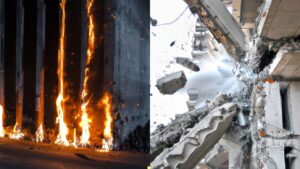
Corso dottorale // Doctoral course
2° semestre // semester
Teachers Patrick Bamonte (Politecnico di Milano), Chiara Bedon (University of Trieste), Antonio Bilotta (University of Naples – Federico II), Matteo Colombo (Politecnico di Milano), Cristoforo Demartino (University Roma Tre), Francesca Sciarretta (European Commission Joint Research Center), Flavio Stochino (University of Cagliari), Ezio Cadoni (SUPSI)
Corso dottorale // Doctoral course
2° semestre // semester
Teachers:
- Patrick Bamonte (Politecnico di Milano)
- Chiara Bedon (University of Trieste)
- Antonio Bilotta (University of Naples – Federico II)
- Matteo Colombo (Politecnico di Milano)
- Cristoforo Demartino (University Roma Tre)
- Francesca Sciarretta (European Commission Joint Research Center)
- Flavio Stochino (University of Cagliari)
- Ezio Cadoni (SUPSI)
Hours: 18
Dates: 24-26 July 2023

Summary
The effects of extreme loads like fire and blast on RC structures is described and analyzed with different models and approaches. The course will enable the students to use simplified methods in the thermo-mechanical analysis of RC structures under blast and fire loading, taking care of the field of applicability of each method.
Description
Both basic and advanced topics concerning fire and blast effects on reinforced concrete (RC) structures are treated in this course, which is organized in two modules.
The first module deals with fire in RC structures, through an overview of significant real fires and of reduced or full-scale fire tests, with an in-depth discussion on materials behaviour at high temperature.
The main differences between the standard and advanced approaches in modelling the fire scenario are discussed as well. Then, the steps required by the thermo-mechanical analysis of RC structures are covered for different levels of approximation with an application to a case study.
The second module is focused on the behaviour of reinforced concrete members under blast loading. The steps necessary to build up a reliable nonlinear dynamic model are analysed, considering the possible collapse scenarios and particularly flexural failures. The numerical methods necessary to solve the problem are. presented with a detailed analysis of the algorithms, inclusive of their implementation. A comparison between simplified and advanced models is provided as well, to highlight the advantages and disadvantages of the various approaches.
The course will enable the students to use simplified methods in the thermo-mechanical analysis of RC structures under blast and fire loading, taking care of the field of applicability of each method.
A final test is required for students who need the formative credits.
Programme
Day 1 – Monday July 24th
9:00-9:15 Saluti
Introduction to the course: exceptional loads in Structural Engineering
9:15-10:00 Antonio Bilotta (University of Naples – Federico II)
Fire Effects on RC Structures Fire Tests and Experiments – Materials properties
10:00-11:00 Antonio Bilotta (University of Naples – Federico II)
Modelling of the fire scenario: simplified and advanced approaches
11:00-12:00 Patrick Bamonte (Politecnico di Milano)
Thermo-mechanical modelling of RC structures under fire
12:00-13:00 Francesca Sciarretta (European Commission Joint Research Centre)
15:00-19:00 Workshop Fire (Donatella De Silva + Patrick Bamonte)
Day 2 – Tuesday July 25th
9:00-10:00 Cristoforo Demartino (Zhejiang University)
Introduction to rapidly varying loads – Constitutive behaviour of concrete under static and dynamic loads
10:00-11:00 Matteo Colombo (Politecnico di Milano)
Single Degree of freedom systems and P-I diagrams for blast design
11:00-12:00 Flavio Stochino (University of Cagliari)
Lumped-mass multi-degree of freedom structures with distributed mass and load
12:00-13:00 Chiara Bedon (University of Trieste)
Numerical methods for RC Structures under blast load
15:00-19:00 Workshop Blast
Day 3 – Wednesday July 26th
9.00 – 11:00 Visit to Lab.
11:00-13:00 Keynote Lecture Ezio Cadoni (SUPSI)
Contacts
concrete.fire.blast@gmail.com
fstochino@unica.it, +39 0706755115
Enrolment
To enrol fill in the online form.

